

Younger Americans and Public Libraries. How those under 30 engage with libraries and think about libraries’ role in their lives and communities Younger Americans—those ages 16-29—especially fascinate researchers and organizations because of their advanced technology habits, their racial and ethnic diversity, their looser relationships to institutions such as political parties and organized religion, and the ways in which their social attitudes differ from their elders.
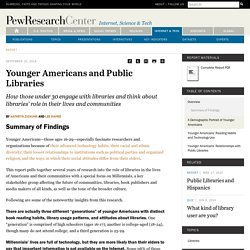
This report pulls together several years of research into the role of libraries in the lives of Americans and their communities with a special focus on Millennials, a key stakeholder group affecting the future of communities, libraries, book publishers and media makers of all kinds, as well as the tone of the broader culture. Following are some of the noteworthy insights from this research. There are actually three different “generations” of younger Americans with distinct book reading habits, library usage patterns, and attitudes about libraries. College Libraries Face Steep Ebook Price Increases - Technology. Academic libraries are trying to process major price increases from publishers for access to their ebooks, The Chronicle of Higher Education reports.
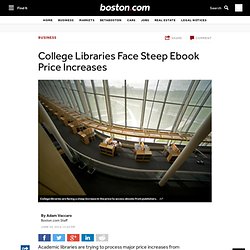
Publishers of academic content are increasing the cost of access to ebooks for college libraries by as much as 300 percent this summer. Last week, Boston.com explored the relationship between public libraries and the publishing industry in the digital age, especially as it pertains to ebooks. Consumers and institutions like libraries do not buy ebooks from publishers. Instead, they buy a license to access the book. Because of that, publishers are able to work around copyright law to charge different prices for and put certain restrictions on different sorts of users. While librarians expressed plenty of frustration while we worked on that story, they were eager to note things had gotten better. That report was all about public libraries. The Chronicle reports academic libraries use a model that allows for on-demand lending. Digital Public Library Of America (DPLA) Launches To Public.
After two and a half years of planning, the Digital Public Library of America (DPLA), the U.S.'s first public online-only library, opened its doors today -- or at least was made publicly available on the Internet.
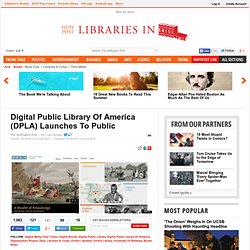
The DPLA is a free, open-source resource that makes a number of digital collections and archives across the country available in one place. It launched as a series of partnerships with the Smithsonian, the National Archives, New York Public Library, the University of Virginia, Harvard, Digital Library of Georgia, Minnesota Digital Library, Mountain West Digital Library and others. North American Working Group To Revise Model License. Mar 13 2014 Libraries today must be strongly proactive in shaping the licenses that govern their campuses’ electronic information resources.
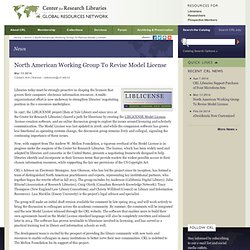
A multi-organizational effort is now underway to strengthen libraries' negotiating position in the e-resources marketplace. In 1997, the LIBLICENSE project (then at Yale Library and since 2011 at the Center for Research Libraries) cleared a path for librarians by creating the LIBLICENSE Model License, license-creation software, and an online discussion group to explore the issues around licensing and scholarly communication. The Model License was last updated in 2008, and while the companion software has grown less functional as operating systems change, the discussion group remains lively and collegial, signaling the continuing importance of these issues. Now, with support from The Andrew W. Survey of university libraries finds diversity developing by institutional type. Library directors and administrators at all types of colleges and universities agree their libraries should teach undergraduates research skills and information literacy, but the Ithaka S+R Library Survey 2013 also suggests libraries are increasingly tailoring their services to address institutional needs.
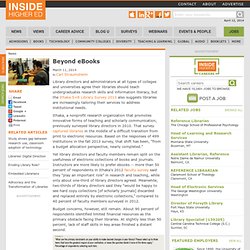
Ithaka, a nonprofit research organization that promotes innovative forms of teaching and scholarly communication, previously surveyed library directors in 2010. That survey captured libraries in the middle of a difficult transition from print to electronic resources. Based on the responses of 499 institutions in the fall 2013 survey, that shift has been, “from a budget allocation perspective, nearly completed.” Yet library directors and faculty members remain split on the usefulness of electronic collections of books and journals. Budget concerns, however, still remain. Roger C. “No approach is perfect -- no survey is perfect, no informal conversation is perfect,” Schonfeld said.